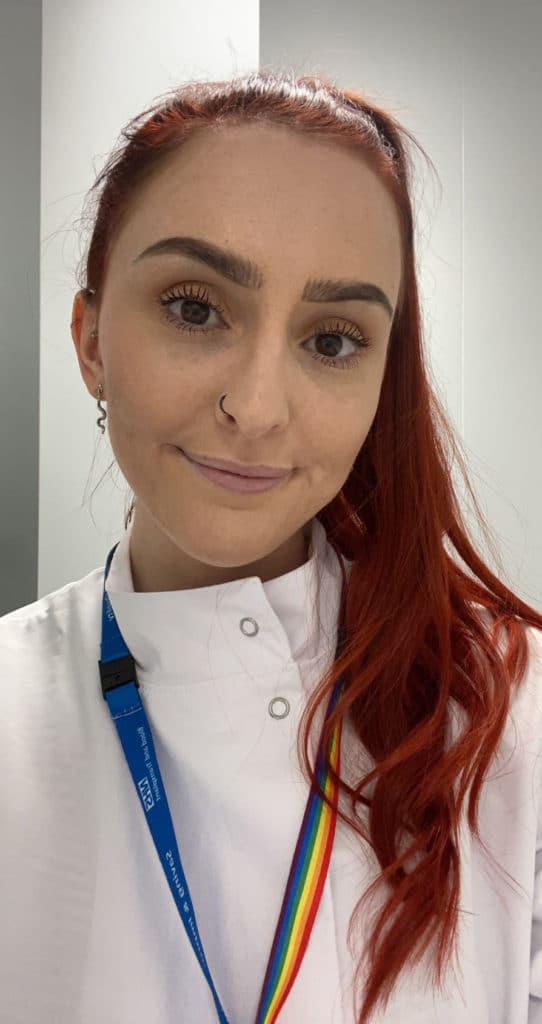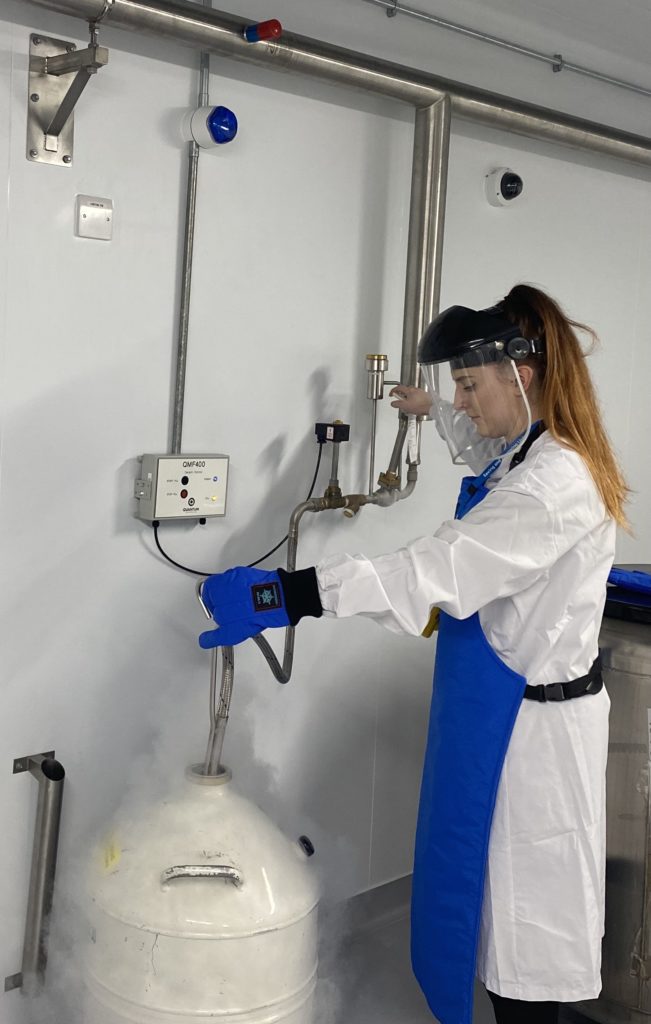About Lauren
Lauren is passionate about science – before starting her apprenticeship through Advanced Therapied Apprenticeship Community (ATAC), she had already been working within a NHS Cardiology Department for 2 years, achieved a Level 3 BTEC qualification, and had obtained A Levels in Biology and Chemistry. She was determined to take her career to the next level but there were no opportunities available in her role in Cardiology to further progress.
Driven by her passion, Lauren searched for opportunities within her field and discovered a Scientist apprenticeship programme within Cell and Gene Therapy at NHS Blood and Transplant (NHSBT). She found advanced therapies interesting and realised the opportunities of studying to obtain a science qualification whilst working in the industry. The location of the role was also what attracted her into embarking on the programme.

One step ahead than university peers
When asked about her experience of her apprenticeship, Lauren told us:
“There is a stigma attached to apprenticeships in that they are sometimes perceived as only being suitable for people who cannot get into university. This is untrue. After seeing the variety of apprenticeship opportunities in my previous role (in Cardiology) and completing an apprenticeship myself now with NHSBT, this couldn’t be further away from the truth. This myth needs to change. They are such an attractive option to everyone, including employers!
“I am studying towards a Foundation Degree as well as completing my apprenticeship, which is giving me valuable practical hands-on experience, whereas students who have chosen to go to university, and studying for the same degree, are not getting in this current environment.

Becoming an integral resource for running lab activities
“I believe that my department’s opinion towards investing in an apprentice has changed since I started. They had never taken on an apprentice before me, they didn’t know what to expect initially (which isn’t necessarily a bad thing!). I think the traditional view is that apprentices are there as a ‘helper’, which may be the case in the first couple of months. However, once you get to know the requirements of the role, the practices and the theory through university, this quickly changes – I play an integral role to the running and activities of the lab and able to provide valuable feedback for improvements. This has created a positive impact on myself and on the team as a whole. I have recently been part of a project where two labs, in two different locations, were being merged into one. I was part of the temperature mapping team on behalf of the Cellular and Molecular Therapies (CMT) function and trusted to act on behalf of the function. I created probe maps and conducted the temperature mapping. I was later recruited to the equipment validation team, playing an essential role in setting up the CMT facility to allow for business continuity upon the arrival of the two labs. I felt really valued from the feedback I received from this role and the team really appreciated my efforts.
Unique employers and apprentices opportunities from receiving the right support
“I have received support from my line manager and the wider team throughout my apprenticeship. NHSBT has an apprenticeship team who have been really helpful as well. My manager tends to check with work-related support, whereas the apprenticeship team will regularly check in about the apprenticeship programme.
“The ATAC team have been amazingly supportive. I would describe them as ‘Accidental Heroes’, because the support and exposure they have provided for me was so unexpected – I wasn’t aware of this when I applied for the role, and I don’t think I would have had the same experience without it. The support, engagement, webinars and network wouldn’t have existed by just completing the degree through a university. I have even had the opportunity to speak at the House of Commons. ATAC have been great!
“If you are considering your options of doing an apprenticeship or going to university, keep an open mind and learn about apprenticeships before making your final decision. We need to break tradition -find alternative routes into jobs and organisations.
If you are an employer, instead of recruiting someone who has a degree and need additional training to put theory into practice, consider recruiting someone with fresh ideas from a different background, support them through their degree and home grow them to suit your needs whilst they are studying! They will then have the qualification needed as well as the skills, experience and behaviours you need. Apprenticeships are really beneficial to companies – to upskill or to recruit someone like me who has experience and changed careers!”
The next steps
Lauren intends to progress to the full degree (Level 6) upon completion of the Level 5 programme, to become a registered scientist.
“Hiring an apprentice is like home-growing your ideal candidate. There doesn’t have to be a choice between work or education – choose both with an apprenticeship. A degree apprenticeship puts you ahead – upon finishing your qualification, you’ll also have 3+ years of on-the-job training.”
The outcome
With the support of ATAC during the course of her apprenticeship, Lauren was able to show her employers the benefits of taking on an apprentice at NHSBT. Throughout her apprenticeship, she proved that supporting an apprentice can be an incredible asset to the workforce, with the NHSBT relying on her to support key projects in their department. Lauren has also had the opportunity to promote the values of taking on an apprentice on a national level, speaking on her experiences at the House of Commons.
About the Level 5 Technician Scientist apprenticeship
Technician scientists carry out laboratory-based investigations and scientific experimentation using established instrumentation techniques and a range of routine and specialised skills following well-established principles associated with an organisation’s science and technology in Advanced Therapies. They work as part of a wider scientific team, which may include laboratory scientists and laboratory technicians, in settings where there is certainty and with limited ambiguity taking personal responsibility for decision making in routine predictable contexts.
This programme is at Foundation Degree level and delivered through University of Kent for 36 to 40 months. Typical job roles may include: Analytical Support Chemist, Technical Support Scientist, Microbiology Support Scientist, Process Development Technologist, Laboratory Assistant, Senior Laboratory Technician, Technical Specialist, Quality Control Laboratory Assistant, Laboratory Coordinator, Technical Laboratory Assistant, Laboratory Analyst, Laboratory Research Assistant.
About NHS Blood and Transplant
NHS Blood and Transplant (NHSBT) is an Arm’s Length Body of the NHS, providing Blood, Transplantation, Diagnosis and Therapeutic services as well as clinical and research products and services to improve patient’s health. Lauren works for the Cellular and Molecular Therapies function within NHS Blood and Transplant. These novel cellular and molecular therapies offer the promise of new treatments and potential cures for many diseases and disorders, and NHSBT is uniquely positioned to support the exciting developments that are taking place in this field. NHSBT’s experience in the processing and storage of stem cells for transplant and the manufacture of clinical-grade advanced cellular and molecular therapies, combined with our strong links to clinicians and hospitals, means helping bring new and ground-breaking treatments to the bedside.![]()
Supported by the Advanced Therapies Apprenticeship Community (ATAC)
Advanced therapies apprentices enjoy access to a wide variety of support provided by ATAC including:
- Access to learning resources and technical webinars from industry experts
- Optional cohort days for apprentices from different organisations to meet, share their experiences and collaborate
- Advice for professional development, such as presenting and networking
- Membership to a network of apprentices, employers, and training providers across advanced therapies
- Access to the ATAC App for further information, resources, community connections and more!
Developing skills and employability for the future
ATAC has prioritised a range of programmes, from entry-level to Master’s-equivalent apprenticeships, to bring in new talent and upskill staff for the rapidly growing UK cell and gene therapy industry. The number of ATAC apprentices more than doubled in one year, now standing at 136 apprentices employed across 36 UK companies, and the initiative continues to provide a platform for developing industry innovators of the future.
